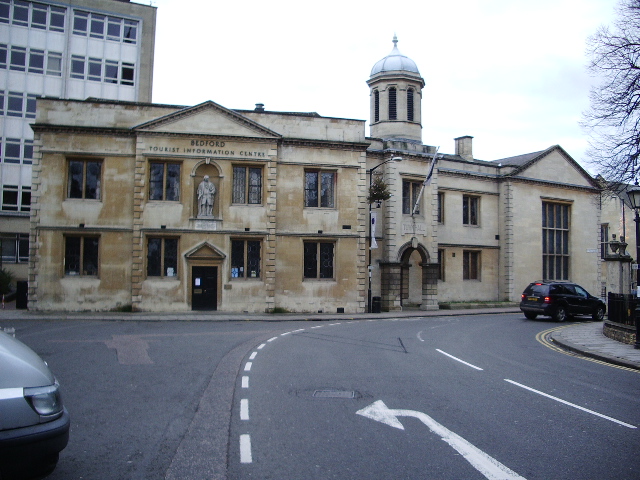|
Bedford To Sandy
Bedford is a market town in Bedfordshire, England. At the 2011 Census, the population of the Bedford built-up area (including Biddenham and Kempston) was 106,940, making it the second-largest settlement in Bedfordshire, behind Luton, whilst the Borough of Bedford had a population of 157,479. Bedford is also the historic county town of Bedfordshire. Bedford was founded at a ford on the River Great Ouse and is thought to have been the burial place of King Offa of Mercia, who is remembered for building Offa's Dyke on the Welsh border. Bedford Castle was built by Henry I, although it was destroyed in 1224. Bedford was granted borough status in 1165 and has been represented in Parliament since 1265. It is known for its large population of Italian descent. History The name of the town is believed to derive from the name of a Saxon chief called Beda, and a ford crossing the River Great Ouse. Bedford was a market town for the surrounding agricultural region from the early Middl ... [...More Info...] [...Related Items...] OR: [Wikipedia] [Google] [Baidu] |
Bedford Castle
Bedford Castle was a large medieval castle in Bedford, England. Built after 1100 by Henry I, the castle played a prominent part in both the civil war of the Anarchy and the First Barons' War. The castle was significantly extended in stone, although the final plan of the castle remains uncertain. Henry III of England besieged the castle in 1224 following a disagreement with Falkes de Breauté; the siege lasted eight weeks and involved an army of as many as 2,700 soldiers with equipment drawn from across England. After the surrender of the castle, the king ordered its destruction (slighting). Although partially refortified in the 17th century during the English Civil War, the castle remained a ruin until the urban expansion in Bedford during the 19th century, when houses were built across much of the property. Today only part of the motte still stands, forming part of an archaeological park built on the site between 2007 and 2009. History Early history (1100–1153) Bedfo ... [...More Info...] [...Related Items...] OR: [Wikipedia] [Google] [Baidu] |
Italians In The United Kingdom
Italians in the United Kingdom, also known as British Italians or colloquially Britalians, are citizens or residents of the United Kingdom of Italian heritage. The phrase may refer to someone born in the United Kingdom of Italian descent, someone who has emigrated from Italy to the United Kingdom or someone born elsewhere (e.g. the United States), who is of Italian descent and has migrated to the UK. More specific terms used to describe Italians in the United Kingdom include: Italian English, Italian Scots, and Italian Welsh. History Roman Britain The Romans from Italy were the first Italians to settle in the British Isles along with other people from various parts of the Roman Empire. They came as far back as 55 and 54 BC when Julius Caesar (initially landing in Deal) led expeditionary campaigns in the south-east of England, and then again in AD 43 when Emperor Claudius invaded and subsequently conquered the British islands. Historian Theodore Mommsen calculated that in the ... [...More Info...] [...Related Items...] OR: [Wikipedia] [Google] [Baidu] |
Unreformed House Of Commons
"Unreformed House of Commons" is a name given to the House of Commons of Great Britain and (after 1800 the House of Commons of the United Kingdom) before it was reformed by the Reform Act 1832, the Irish Reform Act 1832, and the Scottish Reform Act 1832. Until the Act of Union of 1707, which united the Kingdoms of Scotland and England to form Great Britain, Scotland had its own Parliament, and the term can be used to refer to the House of Commons of England (which included representatives from Wales from the 16th century). From 1707 to 1801 the term refers to the House of Commons of Great Britain. Until the Act of Union of 1800 joining the Kingdom of Ireland to Great Britain (to form the United Kingdom of Great Britain and Ireland), Ireland also had its own Parliament. From 1801 to 1832, therefore, the term refers to the House of Commons of the United Kingdom. Medieval background 6th century to 1066 The Witenagemot was the forerunner political institution (that of Anglo-Sax ... [...More Info...] [...Related Items...] OR: [Wikipedia] [Google] [Baidu] |



